Angela Petch's Blog, page 9
December 14, 2019
Find a balance…
It’s that busy time of the year again.

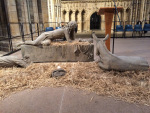
To be honest, I’ve found 2019 busy all year- round. Even when I’m not at my desk, my mind continually whirs with ideas. Writing can be all-consuming.
Apart from recognising that I’ve neglected family and friends, I know I need to find ways to unwind and create time for nurture.
So, my hubby and I took time out last weekend. We took a slow drive north and after popping in to visit his poorly mother, we stopped off in fascinating Lincoln for “us-time” before heading for Leeds, where our youngest daughter lives. It all felt good. A change is as good as a rest.
[image error]
(We decided not to opt for afternoon tea in Leeds city centre)
I’m a writer. I’m nosy. I asked fellow authors what they do to relax. Perhaps their thoughts might help you in your busy routine. I’ve wrapped them up to put under your tree. [image error]
Not surprisingly, walking is a popular relaxation. It’s free and a great antidote to sitting hunched over a laptop.
John Broughton , author of fascinating novels set mostly in the middle ages and who lives in Calabria, told me that “…getting the balance right between writing and relaxing is difficult… To do that, I escape to the unpolluted air and silence of our local mountains – we have them on three sides of or village. The nearest is the coastal mountain chain, the tail end of the Apennines. I usually go with one trusted friend who respects my silence when I need it. We sometimes take a bottle of red wine and a bread roll and make a long morning out of it. On occasions we have the mountain to ourselves. Each season has something different to offer. We enjoy the frozen waterfalls and the cooler contrast in the hot summer months but I love the carpets of cyclamen in the autumn as in my photo.”
[image error]
Helen Christmas has had a tough year. She shared her ways of pushing out “ negative thoughts.”
“Apart from taking ‘Kalms’ on a daily basis, I find yoga to be very calming. After a couple of sessions at our local gym, I immediately began to think more positively. We had a lovely holiday in France too, where the villa owner, Penny, teaches yoga and meditation. She has given me some MPs, so I can practise at home – the Chakra meditation is really good and helps clear the mind. Visualisation also works; picturing those beautiful mountains in France, or a sunset on a beach. Some nights though, when switching off your mind is impossible, I find Dan Jones’ Adult bedtime stories (on YouTube) are great for helping me to drift off.”
[image error]
Helen’s beautiful French mountains
Jessie Cahalin is an author and special blogger. I always enjoy her posts, and she’s recently shared her new mindfulness regime. Check it out
“I always seek solace in the simple things in life. A daily walk is essential for me to connect with my thoughts and relax. I leave the laptop behind and do not think about anything at all. Strolling works its magic and any plot tangles seem to sort themselves out. Just knowing I will pack up at ten and walk ensures that I use time efficiently. Furthermore, exercise also helps me to sleep well. I went through an intense period of writing and composing four blogs a week, and this resulted in terrible migraines. One of my daily strolls gave me the space to realise I was in control of my time and deadlines thus did not need to put myself under pressure. I am lucky to live in an area where meandering county lanes are on my doorstep. I love to watch the scenery transform through the seasons and documenting the changes with my camera helps me to take a closer look at those delicious simple things in life.”
Jessie walking in the country lanes very near to her house.
[image error]
Jane Cable has written one of my favourite books. I love a WW2 story and in her haunting story, Another You ,we have an intriguing pinch of paranormal. Jane writes romance with a twist and a nod over the shoulder at the past. I love her honest thoughts on how to relax.
“I would say walking is a good source of relaxation, but it isn’t exactly time away from writing because I am almost always plotting as I walk. So I should say Pilates, or maybe a little meditation, but no – I’m going to be truthful. To relax I go to the pub. We’re lucky enough to have a proper local and there is no better feeling than dragging a stool to the bar and, glass of wine in hand, putting the world to rights or doing the crossword with our friends. It’s the real world, far away from writing, and I absolutely love it. I say far away from writing, but one day sitting at the bar I heard a story so prosaic in the telling but so eerie in the content, I just had to write it. The result will be published by Sapere Books towards the end of next year.”
[image error]
Thank you, Jane – this really made me smile and I can’t wait to read your new book.
Finally, moving to the USA and friends I’ve happily discovered through social media, meet supportive Jenn Hanson-de-Paula. I find her help for authors inspirational. She writes a fabulous blog and runs courses and I follow her avidly on Instagram and FB. Take a look at Mixtus Media
“Relaxing is something I’m having to relearn. As a business owner, wife, mother, someone involved in her community, and so on, it can feel like I have no time for myself. I know many women feel this way and are in similar situations.
I’ve tried various hobbies to try to relax, but they ended up being more work. So how I relax is very simple: I go to the library. There is something so soothing and comforting about that sacred place. Roaming the stacks of books, looking at other book lovers seeking out their next read, and talking with the wonderful librarians is a haven for me.
My husband can tell when I’m feeling stressed and overwhelmed. He often will look at me and say, “Do you need to go to the library?” It’s my favorite way to relax! 
November 28, 2019
Location, location, location
Meet Lexi Rees, a fellow member of Chindi Authors – a group that I’m proud to belong to.
[image error]
Lexi’s latest children’s book was published yesterday: Wild Sky (I love the title – it intrigues me before I start reading). As some of my five grandchildren are rapidly approaching Key Stage 2 (7 to 12 years), I’ve started to look out for new reading ideas for them. I still love the old classics, but things move on, don’t they? Listen in to our chat over coffee and cake (without lashings and lashings of ginger beer.)[image error]
Thanks so much Angela for inviting me onto your blog to chat about writing, and more specifically, the process of fictionalising locations.
When I do author talks, I’m always asked about the locations in my books. The Relic Hunters series is basically an introduction to dystopian fiction for young readers which means that whilst the basic world is recognisable, I’m in a position where I can take some artistic license. Also, because the series is essentially a quest story, I have a lot of locations. The journey in book one, Eternal Seas, moves from a tropical island, through bustling bazaars and culminates in a ruined castle on a remote Scottish island. The sequel – Wild Sky, published on 28 November 2019, sees the young adventurers leave the Scottish island and head for a monastery in the Himalayas. Given the huge variety, I find it very helpful to have a real place in mind when I set a scene. I’m lucky to have lived overseas and also backpacked around the world (admittedly when I was quite a bit younger), so I have a large pool of personal experiences of locations to use.
As we are both members of a Chichester writing group, Chindi Authors, let’s take a deeper look at a local spot that I’ve featured. The Relic Hunters get a clue that means they need to find an observatory to look at the stars on the Cold Moon (the last full moon of the year). I chose to base this scene at Spitbank Fort, a former military stronghold in the middle of the English Channel near Portsmouth. This is perfect since the characters are smugglers who live on a boat, plus I’ve sailed round it many times myself and been intrigued by the lack of a pontoon to tie up on – there appears to be no more than a few iron railings, which obviously just adds to the appeal to a writer looking for a quirky setting.
[image error]
Spitbank Fort was built between 1865 and 1880, along with three other forts (the Palmerstone forts) at a total cost of £1,177,805. Obviously by the time they were finished the threat of invasion had gone so although the forts were armed, they were never used in battle. They were decommissioned in 1956 and put up for sale the 1960s, although they were not sold until the 1980s. Had I won the lottery, I would have LOVED to buy one! Actually, I would still love to live in one. Either that or a lighthouse. That would be awesome, although I appreciate Tesco’s might not deliver my groceries.
It’s actually now a luxury hotel – you can check here but I have used none of the interior. I had to have a domed observatory. The forts are currently up for sale. I gather the price is £8 million, but sadly I’m still waiting for that lottery win.
Anyway, back to the writing. Of course, given the diameter is only 50 metres, it’s not really enough for my required location. I needed to have my baddie set up a camp there and build an observatory, so the interior is entirely inaccurate. I plead artistic license!
I hope that was interesting. Happy to answer any questions!
And thanks again Angela for inviting me to join you.
You’re very welcome. That fort reminds me of pirate radio stations, or a modern-day Famous Five adventure destination, or a fortress to fight for, or a ghostly story, or… I can see why you picked it for a location. Being a writer is an excuse to imagine a whole load of adventures, isn’t it?
If you’re looking for stocking fillers for youngsters in your lives, this would make an ideal gift. Another ticked off.
STOP PRESS: To celebrate publication of her new book, Lexi has a giveaway for you: a chance to win a copy of Eternal Seas and Wild Sky, both action packed fantasies for 7 – 11 year olds. (UK – choice of signed paperback or ebooks). (International entrants – e books only).
ONLY AVAILABLE FROM 24th November – 19th December. So – hurry!
Wild Sky Book blurb:
‘This action-packed blend of magical fantasy with classic kids adventuring is a swashbuckling read for 8+ year-olds, peppered with soft line-drawings and propelled by a strong sense of urgency.’ – LoveReading4Kids
‘Non-stop adventure with an exciting blend of magic and dystopia. Sinister villains, strange magic and thrilling adventure. I loved it!’ – Claire Fayers, author of The Accidental Pirates series, Mirror Magic and Storm Hound
‘Raging seas, snowy lands, fortresses and monasteries – the quest for the relics continues at an exhilarating pace. You won’t put it down!’ – Jude Lennon, author of the Hal series and other books
After delivering the pearl, Finn and Aria thought life would return to normal.
But with the survival of the clans still in peril, they must continue their quest.
Can they find the next relic before the forces of evil?
Not everyone is who they appear to be
And time is running out …
Author bio:
Lexi Rees was born in Scotland but now lives down south. She writes action-packed adventures and workbooks for children.
The Relic Hunters #1, Eternal Seas, was awarded a “loved by” badge from LoveReading4Kids and is currently long-listed for a Chanticleer award. The sequel, Wild Sky, is available for pre-order now.
She’s passionate about developing a love of reading and writing in children and, as well as her Creative Writing Skills workbook, she has an active programme of school visits and other events, is a Book PenPal for three primary schools, and runs a free online #kidsclub and newsletter which includes book recommendations and creative writing activities.
In her spare time, she’s a keen crafter and spends a considerable amount of time trying not to fall off horses or boats.
November 10, 2019
What if?
It’s one month since my last blog (sounds like the opening to a Catholic confession). But I’ve been busy between my two lives. Packing up to leave Italy for the winter, like some migratory bird (albeit weighed down with more than feathers) and settling in for the winter months in England. It seemed appropriate that we left Tuscany with the landscape half concealed in mist.
[image error]
Between catching up with our family and nesting, I have had my head down with edits for my new book due out in February 2020. I know I have been bleating on about this and telling you I find edits hard but recently I have had a lightbulb moment. As is so often the way, simple is best and what helps, is the simple revelation that “what if” is liberating and… fun. Why didn’t I realise this before?
I’m not talking about the “what if” in regret. What if I had done this or that? The negative, looking back kind of thinking. I mean the “what ifs” that can stir up my imagination.
So, when my lovely editor at Bookouture now suggests tweaks here and there, or to deepen the mystery, I’ve stopped those panic moments of despair that everything I have written so far has to be unravelled. Instead, I’ve had a great time thinking outside my original box of ideas.
Albert Einstein famously said:
“Logic will get you from A to B. Imagination will take you everywhere.”
Deepak Chopra’s statement is a great help too:
“The best use of imagination is creativity. The worst use of imagination is anxiety.”
I feel the mist has lifted.
[image error]
October 10, 2019
Changes…
I’m gardening and editing at the moment and the two processes are very similar. I received my second round of structural edits two days ago and as I move plants around, dig others out and stand back to gain perspective, it mirrors the thoughts mulling in my mind about my WIP.[image error]
There’s a lot of digging involved in my Tuscan garden. I have to remove nine very leggy lavender plants and I’ve come to the conclusion I shall need help. A shoulder operation a couple of years ago limits what I can do.
I am having help with my writing too. I am truly blessed to be working with my editor at Bookouture and she is very encouraging. When I read her opening words about what I had done so far, I was very happy: “Wow wow wow. I can’t stress enough how much I love the changes you’ve made at the last edit.”
But she is very honest too and there is more work to be done in the next couple of weeks, both in terms of packing up our Tuscan home and re-writing certain sections of my Tuscan novel. My editor’s words again: “Thinking in terms of dramatic thread, …[sic] what do these chapters add to the story – how do they progress the narrative?”
It is great to have this help. Having written over 100,000 words, it is hard to stand back and properly see. It is still my book, but an objective point of view from somebody who is in the business of selling books is wonderful. I would be a fool not to listen.
Two days ago, we also returned from the annual break we take once all our bookings for il Mulino are finished. We went south to Puglia. I hadn’t realised how tired I was, but a change is as good as a rest, they say. Before I went away – and even on the long drive south – I was typing words in my brain. But a break was needed and, after eight days, I’m ready to go again. When I am so immersed in my writing, I tend to neglect dear ones. I am sorry for that. A balance is necessary.
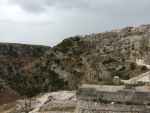
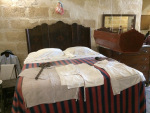
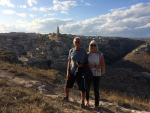
Just over the border into Basilicata, we visited the higgledy-piggledy town of Matera where people lived in caves (sassi) until the 1970s. Carlo Levi, a writer, painter and physician, wrote about their plight in Christ stopped at Eboli. Because of his anti-fascist activism, he was exiled to live in a remote area of Basilicata in 1935-36.
[image error]
It occurred to me that I had to read this book over forty years ago when I was at university, but I couldn’t remember much about it. My copy is still in my bookcase in England, with my maiden name written inside. I shall now read it again, but with interest this time, rather than because it was on my reading list. Youth is wasted on the young is a phrase easily bandied, but I do think I would get more out of studying for my degree now. But what-ifs are pointless. I am enjoying life now. Some writing friends wish they had started writing earlier in their lives, but I think I had to gather lots of experiences and adventures before I was ready to embark on my books.
The trip has inspired another book and I can’t wait to get started on it. I am so in love with Italy and cannot help but be inspired. It has its problems, but… so do we in Britain at present. I am not looking forward to returning to the divisive atmosphere that Brexit has stirred up.
Here are some photos of Puglia and Basilicata. Let the pictures tell the story.

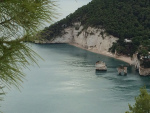

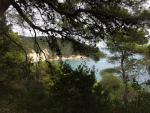
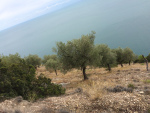
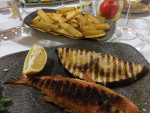
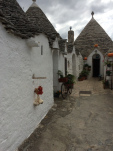
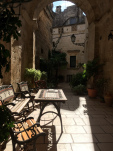
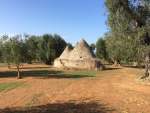




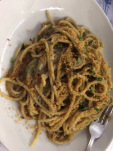
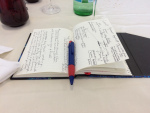
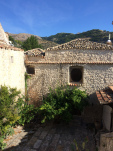
Now, back to those structural edits.
Ciao for now.
September 26, 2019
Allegories and edits…
Yesterday I went for a long walk despite needing to be finishing structural edits.
Discombobulated I was (love that word), and I needed an untangling session.
[image error]
I’d believed I was nearly there with straightening out and layering my next Tuscan book. On track to send it a day before we leave for our little holiday in Puglia. But my lovely editor at #Bookouture sent me an e mail out of the blue. She was apologetic about the timing, but had come up with some fresh ideas. The rug pulled from under my feet, all at sea, up in the air, bothered and bewildered, headless chicken, raised blood pressure, panic… yes, all those things… all clichés, I know… but I felt them all.
The thing is, I was self-published before. Now, I have somebody guiding me and it’s all new. ‘It’s MY book,’ I wanted to scream. What are you doing to me?’
‘Be quiet, woman,’ I argued back. ‘Look how you’ve been helped with The Tuscan Secret Did you manage to sell over 21,000 copies in its original version?’
So, abandoning my scatterings of notes and pages, I went for a favourite walk. It usually helps. The climb up the mountain is steep; a narrow, stony mule track through woods.
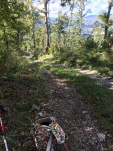
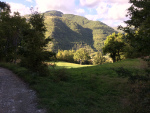
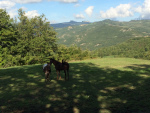
The verges were studded with tiny cyclamens, like little promises. Lizards scuttled back under leaves as I approached. Four deer ran across the path above me and disappeared (much like the four chapters I had already culled). Was this a message?
My destination was the tiny village of Tramarecchia, the home of my main character, Massimo. It’s one of the many uninhabited hamlets dotted around this corner of Tuscany. There are signs that the owners still visit from time to time: a pruned fig tree, the chains for a child’s swing, rosemary and sage growing by a front door, half the grapes harvested from a vine. I sat by the washing troughs in the middle of the grassy square and asked my characters what I should do.
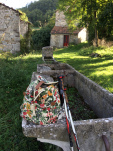
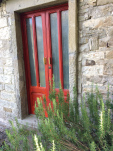
They weren’t really there, I know. They have stepped into my book. I had created them from imagination and borrowed stories. But they are very much in my head and I did talk to them. I began to calm down, sitting there in the quiet. Usually I pull out a notebook and jot down ideas. But I listened. If I had invented them in the first place, I could tweak what happened to them. Sitting there quietly helped me gain perspective.
I know my editor wants the book to do well. And I shall do my very best to be objective while I complete the next days’ edits. But that does not mean I shall change everything.
On the way home, I felt less coiled up inside. My shadow, as the afternoon sun lengthened the shadows, walked tall in front of me, leading the way back to my edits. I stepped over wolf prints in the mud, but the danger was past.
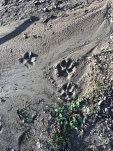

I would love to know how others cope with this process? Do let me know.
September 23, 2019
Don’t you just love coincidence?
And here is the new blog from another lady who attended #WriteAwayinTuscany. I’mlooking forward to reading her debut novel when it comes out in Spring.

Or would you call it serendipity? Fortuity? Whichever term you prefer, I’m grateful for it. And here’s why …
Yesterday, a friend posted on Facebook. She recommended a blog on tips for using social media; exactly what I need right now. The article reinforced my belief that social media is the best way to build a productive network. Happily, I’ve ticked two of the boxes already. I just need to work on a Twitter account. Here’s the link … I recommend a read.
Today, I met a lovely lady. She’s the same age as the heroine in my next novel but, best of all, she’s a gardener. Exactly the job I’d envisaged said heroine doing! How’s that for chance? Fortunately, the lovely lady is holidaying near-by, so I will be able to pick-up a font of information. And, yes, I bet we end up as friends on Facebook!
View original post 41 more words
September 19, 2019
Writing In Tuscany
Lovely words from one of the participants in #WriteAwayin Tuscany that came to an end yesterday.
What a great week – I kept thinking of the quote from She Stoops to Conquer, which I appeared in twenty years ago now (a college production, I hasten to add). – “I love everything that is old; old friends, old times, old manners, old books, old wines.” So I love everything about a Tuscan writing week – new friends, simple, delicious food, free-flowing wine, great conversation, fabulous hosts, amazing venue and – time to write.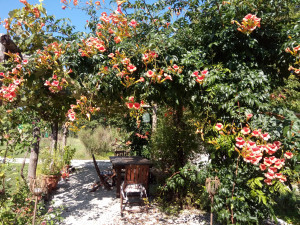
We sat underneath this bower of trumpet flowers each morning, staring up at clumps of ripening grapes, pen and paper at the ready for whatever exercise we were set, breaking for a lunch of fresh salads, different hams and sharp sheep cheese with vino of course. Then came time for our own writing or contemplation. I loved listening to the thin stream of water gurgling over the mountain strewn parchment of stones. One morning…
View original post 241 more words
August 17, 2019
Old friends…
I have quite a few friends who are older than me here in Tuscany.
Yesterday I dropped in on my ninety-nine-year-old gentleman friend. He was sitting on his bench in the shade. At his feet were a couple of dogs and a kitten rested nearby. It was very hot, and the flies were pestering him, and I helped bat them away.
He started to tell me of the time when he was a prisoner in Libya during the war. How sweltering it was during the night; how little water he had to drink. Sometimes he remembers a word or two of English, because he was in Nottingham for more than six years, working on a farm as a prisoner-of-war, and I take him shortbread biscuits to nibble on. He also remembers rice pudding with fondness… His son turned up at lunch time, having spent the morning searching for mushrooms and I said my goodbyes. Each time, I wonder when the last will be, but at least his stories will live on in my next book.
[image error] I love that Simon and Garfunkel song, “Bookends”. When it came out in the 60s, I was a teenager and I can remember agreeing with the line,” how terribly strange to be seventy”. But that age is not too far away for me now and my precious, elderly friends are in their nineties.
I cherish them and their words. Bruno says he feels fine inside, but it’s his body that lets him down. I could spend hours listening to my old friends. They know I like writing and they are pleased to share their experiences. Bruno is appearing in my next Tuscan book, disguised with another name and with slightly different adventures. (It is with my Bookouture editor at the moment.) Watch this space, as they say.
Ida (in her eighties) was making pasta by hand when I dropped in on her two days ago.
[image error]
She used to live in the mill that we let out to guests; she has shared many details with me and they made their way into The Tuscan Secret. As a little girl she also travelled down to the Tuscan coast with her parents on the annual transumanza, to take sheep and cows to better pastures over the winter months. That is a way of life that has disappeared and, thankfully, our local tourist office is recording memories of our elderly folk before they are forgotten. We tend to romanticise the past, but most of them would not wish the hardships they endured on this generation. See Now and Then in Tuscany for more details.
One thing that the elderly do miss nowadays is the conviviality that used to exist in the community. Neighbours sat with each other in the evenings, chatting, mending, sharing tips and advice. Now, the television blares forth and people don’t venture into each other’s houses so much. The veglia has all but disappeared.
At lunch today, Maurice and I shared a feast with another elderly friend in the old house where she was born.
[Evalina is on the right]
[image error]
In the past, Evalina always catered, but she’s ninety-three now and frailer. So, we took along the food and wine instead, introducing a couple of dishes from Britain – including lemon drizzle cake. Afterwards, we sat in the shade of her plum trees that buzzed with insects, and she talked of the past. I lap it all up like a kitten with a huge saucer of cream.
They are all tiny of stature and I am tall even by English standards. “What’s the weather like up there?” they joke, and they call me “skyscraper”. I take it as a form of affection. I am certainly fond of them.
I won’t quote the Bookends song in full that I love, because I’m not sure about copyright, but look up the words some time, about the old friends, the winter companions… waiting for the sunset…
And, bless our elderly!
July 28, 2019
Dear diary…
July is nearly at an end and it’s been a bit of a baking, writerly whirlwind for me. Apologies in advance if this blog is all a bit me, me, me. Writing it is a little like recording in a journal. I’ll forget otherwise. Dear Diary…
I made a madcap weekend return to England from Tuscany, where I live in the summer, to attend the 2019 RNA Conference in Lancaster. The journey was quite stressful, and I’ve decided not to repeat such a “blink-of-the eye” visit next year. I will tag days on at either end to see family and friends.
But it was worth it. Although I arrived too late on the Friday to catch any talks, I finally met up with lovely Jessie Cahalin of Books in my Handbag .If only there’d been more time to talk… Jessie is now on the excellent New Writers’ Scheme and I wish her all the success in the world. She is so supportive of other authors; it is time to concentrate more on herself.
[image error] Jessie Cahalin – one of my heroines
[image error]I also met my fantastic editor from Bookouture for the first time and although Ellen Gleeson is young enough to be my daughter, it still made me feel grown-up. I still pinch myself at how my writing adventure is panning out and still can’t quite believe I have a publishing deal. As an author I spend so many hours hunched over my laptop or notebook, in the company of my characters and make-believe, so that to venture into real publishing world, to meet other authors and industry professionals, is a little scary. But, it’s very self-affirming.
I had just arrived from a plane and train journey from Italy when this was taken and gasping for a cuppa. Wine would come later. True Brit…
Forgive this selfie with amazing Katie Fforde and Jo Thomas (they didn’t seem to mind – what sweethearts!)
[image error]
I love the RNA. The title, Romantic Novelists Association, initially conjured for me an image of fluffy pink slippers and heaving bosoms, but there is far more to this organisation of clever, friendly authors than that. I could have dipped into all the sessions, but there is a limit. The weekend is full-on and tiring. These are some of the invaluable talks I attended:
• Keep that Sexy Momentum Going (hilarious and informative 
June 30, 2019
The long and the short of it…
It’s been a special week for me, seeing my revised Tuscan novel, The Tuscan Secret released by Bookouture and I’m so grateful for all the support I’ve received.[image error]But, I don’t like blowing my own trumpet, so let’s meet and congratulate the lovely Wendy Clarke today. She is one of my writing heroines: she’s had over three hundred stories published in women’s magazines, which is amazing. (I am happy so far with my baker’s dozen). I always enjoy her stories. They are easy to read and there is often a lesson to learn.
But she has branched into novel writing and has also been taken on my Bookouture. I chatted to her recently, curious to know how she approaches writing for these different genres. Her new novel, What She Saw is doing really well and I really enjoyed this psychological thriller of a page turner.
[image error]
1. I know you are a very successful short story writer., Wendy. How differently did you approach writing your debut novel?
Very differently! When I write my short stories, I start with just a seed of an idea that germinates and grows as I write it. I absolutely never plan. Sometimes I’ll have the beginning, sometimes the ending and sometimes just a character or setting I know I’m drawn to. When I started writing my novel, it was a very different process. I started out with the attitude that I didn’t need to plan – after all, it had worked for the short stories. But I found I kept losing track of the storyline and wandering off down unexpected avenues and finding some of them were dead ends. Eventually, I found a mind mapping App on my iPad called Total Recall and it saved me. When I wrote my second novel, it was part of a two-book deal and I had to write a synopsis for my publisher. A synopsis! Not a word a panster likes to hear! I’m not quite sure how I managed it, but, with the help of my mind mapping App, I did, and it really helped me when it came to actually writing the whole thing.
2. What did you find easy and what did you find hard in writing a novel?
As I mentioned in the last answer, planning is the hardest part for me, followed by the blank first page before you start and the inevitable soggy bottom. Once the novel is written the structural edits can prove to be a challenge too! The easiest part is the last third… I whiz through that!
3. Can you tell us what inspired What She Saw ?
What She Saw was inspired by my love of the Lake District. With it’s beautiful, dramatic and ever-changing landscape, is the perfect scenery for building suspense. The fictitious village my protagonist Leona’s family live in, is based on Chapel Stile and their miner’s cottage is the one my husband and I have stayed in many times during our wonderful holidays there.
4. Can you tell us a little bit about the process of being published by Bookouture? I know what this is like – they are fantastic – but it will be interesting to many authors.
As with all publishers, the process once your book had been accepted is a long one. First, you will work with your editor to make the novel as good as it can be – the pace, the emotion, the plot. These are the ‘structural edits’. Next come the line edits where your editor will look at your work more closely. After they’re happy, the novel will go to an independent editor for copy editing and proofreading. Four layers of editing in all! The final stage is the checking of the eBook and paperback proofs. Alongside this, your editor will be working with a designer to create a great cover! The whole process takes several months but is crucial.
5. Are you still submitting short stories to women’s magazines? If so, is it hard to switch from short story to novel writing?
When I wrote my first novel, it was without an agent or a publisher, so I had the luxury of being able to take as long as I wanted to write it. This meant that I was able to continue to write short fiction for magazines at the same time. I managed this but did find it hard to switch between the two story lengths and whichever one I was working on, I felt guilty for not working on the other. With my second novel, I was writing under contract and had to submit my novel within a stated time. Sadly, this meant taking the decision to stop writing the magazine stories in order to concentrate on my current project.
6. What do you like to read in your free time?
My one regret with writing novels is that I don’t read nearly as much as I used to. When I do, I like reading in my genre of psychological thrillers, although one of my favourite novels is The Promise by Ann Weisgarber. I rarely read fantasy or romantic comedy.
7. Where do you write? What time of day? Pen and notebook or laptop?
I write mostly in my conservatory in the summer and my living room in the winter. I have a writing room upstairs which I have never written in – partly because my dog isn’t allowed upstairs and I feel guilty leaving her! I write whenever I can fit it in. Morning or afternoon but never the evening. That’s my down time. All my writing goes straight onto the computer. I can’t even begin to imagine writing in longhand (besides, I’d never be able to read my writing).
Thank you so much for taking the time to answer my questions, Wendy. I know you’re busy with a new two-book contract and your second novel We Were Sisters is on pre-order and coming out soon. Good luck with it all!
Meet Wendy
[image error]You can find out more on her website
On her Author Facebook Page
On Twitter
And see her delightful photos on Instagram





